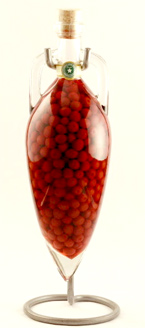Cranberry Juice – Cure For Urinary Tract Infection

Cranberry, a native American species, is a miraculous berry plant. Just like their relatives blueberries, aroniaberries, and blackberries, cranberries are an excellent source of vitamin C and bio-flavonoids. The color of the cranberries originates from the presence of a special type of bioflavonoid called proanthocyanidin. This is similar, for example, to the carotenoids that provide the yellowish-orange color of carrots, or to the well known example of chlorophyll that provides the green color in leaves. In fact, most of the bluish, reddish and purple hues found in plants can be traced back to the presence of bio-flavonoids.
What makes the bioflavonoids especially important is their antioxidative activity. They protect the plant from the free radicals that occur as a result of ultra-violet solar radiation. In people, the bioflavonoids are useful for reducing the amount of free radicals that if, present in large concentration, could damage the individual cells and proliferate degenerative tissue changes and diseases in the long run.
In particular, the cranberries’ bio-flavonoid proanthocyanidin has been proved to ameliorate the formation of free radicals and reduce the symptoms of chronic age-related disorders. It regulates the antioxidant defense mechanism and improves insulin sensitivity. It also stabilizes the collagen, which is protein that is sometimes referred to as body’s cement that keeps everything in place and strengthens the connective tissues, including blood vessels and muscles.
 When juiced, cranberry juice is primarily used to help in cases of urinary tract infections. At first, trying to decipher the mystery of this home-made remedy, researchers suspected that the acidity of cranberry juice is to be held responsible for the success in treating this type of infections. As it turned out latter on, this assumption was completely wrong.
When juiced, cranberry juice is primarily used to help in cases of urinary tract infections. At first, trying to decipher the mystery of this home-made remedy, researchers suspected that the acidity of cranberry juice is to be held responsible for the success in treating this type of infections. As it turned out latter on, this assumption was completely wrong.
Cranberry juice belong to the type of foods that are very acidic as such. But the right question is what happens with cranberry juice as it enters the body? Even though this juice is very acidic per se, it is only mildly acid forming when ingested in the body. This is something similar to the well known fact that many of the citrus fruits, like oranges and lemons, are acidic when produced, but after drinking they have a strong alkaline effect in the body.
So the acidity is not essential for the health improving features of cranberry juice. Researches have found that cranberry juice in fact inhibits the growth of urinary-tract infection-causing bacteria, primarily the main cause of trouble – the E.coli bacteria. In addition, the proanthocyanidin present in the cranberries inhibits the ability of these bacteria to attach themselves to the wall of the urinary tract, therefore preventing their further growth. A study published in the journal of Molecular Nutrition & Food Research actually concluded that cranberry juice seems more effective at preventing future bacterial infections than treating an existing one.
Cranberry juice can therefore be considered a proven natural remedy for urinary infections. It is also increasingly being considered in connection with heart and circulatory disorders.
When not juiced, the cranberries also provide a lot of fiber, which can be useful for improving digestion or can help if you are on any type of diet.
Some important facts you should know:
- That the upper limit of cranberry juice you should consume is something like 1 liter, or 4.2 cups per day (source Medline Plus).
- One cup of cranberry juice contains 137 calories, 2% of which come from fat and 98% from carbs.
- It takes about 2 pounds of fresh cranberries to obtain 1 1/2 cup of cranberry juice.
Cheers!

Nice blog. Thanks for this useful information.The urine is normally sterile. An infection occurs when bacteria get into the urine and begin to grow. The infection usually starts at the opening of the urethra where the urine leaves the body and moves upward into the urinary tract.
Thanks for this additional information.
This is very interesting article. Dr. Rajesh Taneja Urologist Delhi- specializes in Interstitial Cystitis.